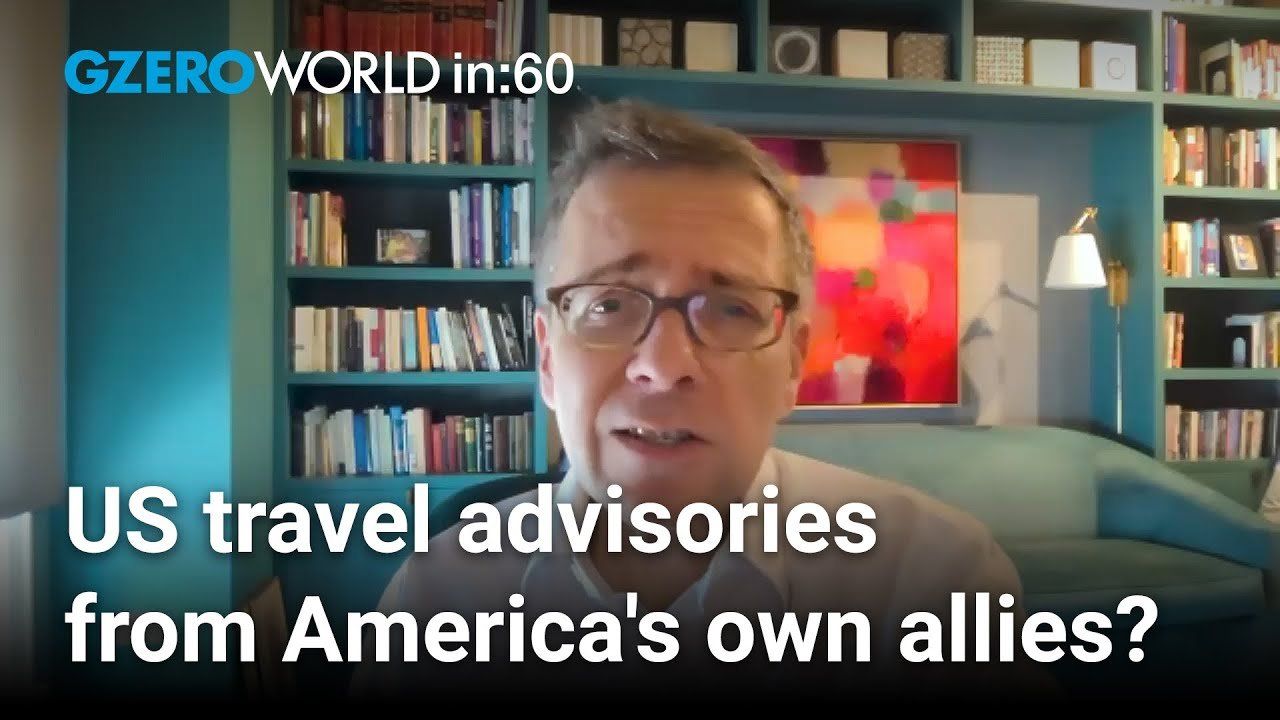Ian Bremmer shares his insights on global politics this week on World In :60.
Why are some countries issuing travel advisories for visiting the United States?
You'd call it an abundance of caution, but things are moving very quickly in the US. It's only been two months since Trump has been inaugurated. And many countries, allies of the US, feel that treatment of their citizens will not be aligned with rule of law in the United States. Certainly, worry given, for example, some green card holders facing deportation for what would be considered for an American citizen just exercise of freedom of speech, freedom of organization.
Also, they've seen what's happened with law firms and the chilling impact of Trump going after them if they are engaged in supporting lawsuits against the government. All of those things and a recognition that these are moving fast and getting more challenging quickly, quickly, quickly, is making a whole bunch of American allies issue travel advisories telling their citizens, "You shouldn't be traveling to the US right now." We've already seen a big economic impact of Canada tourism to the United States hurting the US economy. Haven't seen that as much from Europe yet, but I expect that you will. And of course, in terms of people that are applying for green cards and wanting to get jobs in top American corporations or apply to be students at top American universities, I think that's going to have a big impact going forward longer term.
How are the political tensions in Netanyahu's government impacting the war with Hamas?
Well, the fact that the far-right coalition is fully back together because the war has restarted. That's why the far-right party left, and that was because they didn't like the ceasefire and they certainly were opposed to phase two that would've led to the Israelis to do a full pullout of the military from Gaza. Well, now the war has restarted, the Israeli government is talking directly about annexation if the hostages are not all released. And they're doing that with full support of the United States. Big demonstrations in Israel, concerned that Israel is no longer going to be a democracy, especially because the prime minister has now sacked his Attorney General, has sacked the head of the Shin Bet, both unprecedented for Israel since independence. But Netanyahu has full support from his coalition and from the United States. So, he's in a strong position right now.
Will public outcry over the arrest of Istanbul's mayor lead to major political reforms or shifts within the Turkish government?
I don't expect so at all. They are allowing for large demonstrations to continue in Istanbul, even though President Erdogan has said that's illegal, in part because there's a lot of media there. There's a lot of focus there. They clearly want to limit that violence. But they've been cracking down really hard everywhere else in the country, including the capital, Ankara. They've dealt with this sort of thing in the past. The military is fully aligned with Erdogan, and the top is quite politicized. Media, dido, overwhelmingly aligned with the state. So is the judiciary after the failed coup attempt.
So for all of those reasons, I think this is going to be a move from Erdogan towards a more direct autocracy as opposed to a hybrid system. Unfortunate and yet one more place where the Europeans are in trouble. But nonetheless he's been quite useful to a number of other countries around the world in terms of dealing with refugees from Syria. If you're the Europeans, dealing with Turkey on the ground, dealing with Syria on the ground, and stability if you're the United States. And the Gulf States have found him useful as an interlocutor as well on Russia-Ukraine too. So for all of those reasons, very important internationally, very repressive domestically. Two things I expect to continue.
More For You
2.5 million: The population of Gabon who can no longer get onto certain social media platforms, like YouTube and TikTok, after the government suspended access on Tuesday.
Most Popular
What’s Good Wednesdays™, February 18, 2026
Nuclear is back on the global agenda
Chris, an Army veteran, started his Walmart journey over 25 years ago as an hourly associate. Today, he manages a Distribution Center and serves as a mentor, helping others navigate their own paths to success. At Walmart, associates have the opportunity to take advantage of the pathways, perks, and pay that come with the job — with or without a college degree. In fact, more than 75% of Walmart management started as hourly associates. Learn more about how over 130,000 associates were promoted into roles of greater responsibility and higher pay in FY25.
Last week, at the Munich Security Conference, a group of global technology providers, including Microsoft, announced the Trusted Tech Alliance — committed to shared, verifiable principles for trusted, transparent, and resilient technology across borders. At a moment of economic volatility and zero-sum technological competition, countries and customers are demanding greater accountability from technology providers. The Alliance addresses this by bringing together companies from across Africa, Asia, Europe, and North America around shared commitments: transparent governance, secure development practices, supply chain oversight, open digital ecosystem, and respect for the rule of law — ensuring the benefits of emerging technologies strengthen public trust while driving job creation and economic growth. Explore the Trusted Tech Alliance here.
At the 2026 Munich Security Conference, entrepreneur and Project Liberty founder Frank McCourt makes the case that the internet, and the AI systems rapidly reshaping it, must be redesigned to serve people, not platforms.
